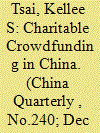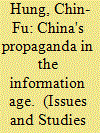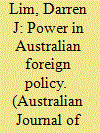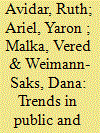|
|
|
Sort Order |
|
|
|
Items / Page
|
|
|
|
|
|
|
| Srl | Item |
| 1 |
ID:
169792


|
|
|
|
|
| Summary/Abstract |
Social media in China has not only become a popular means of communication, but also expanded the interaction between the government and online citizens. Why have some charitable crowdfunding campaigns had agenda-setting influence on public policy, while others have had limited or no impact? Based on an original database of 188 charitable crowdfunding projects currently active on Sina Weibo, we observe that over 80 per cent of long-term campaigns do not have explicit policy aspirations. Among those pursuing policy objectives, however, nearly two-thirds have had either agenda-setting influence or contributed to policy change. Such campaigns complement, rather than challenge existing government priorities. Based on field interviews (listed in Appendix A), case studies of four micro-charities – Free Lunch for Children, Love Save Pneumoconiosis, Support Relief of Rare Diseases, and Water Safety Program of China – are presented to highlight factors that contributed to their variation in public outcomes at the national level. The study suggests that charitable crowdfunding may be viewed as an “input institution” in the context of responsive authoritarianism in China, albeit within closely monitored parameters.
|
|
|
|
|
|
|
|
|
|
|
|
|
|
|
|
| 2 |
ID:
106256


|
|
|
|
|
| Publication |
2011.
|
| Summary/Abstract |
Ever since the Mao era, propaganda has been the primary vehicle in China for the indoctrination and mass mobilization of citizens. In the last few years however, as China has continued to open up to the outside world and deepen its reforms, it has experienced an unprecedented boom and liberalization of its media sector. While the propaganda regime continues to attempt to guide and shape public opinion, the conventional propaganda apparatus is not as effective as it used to be. This has given rise to a new governing mechanism that employs Internet commentators to direct cyber discussions and create favorable online opinions about the party-state. Accordingly, this paper addresses the new phenomenon of Internet commentators and argues that the creation and increased utilization of such commentators has provided the Beijing governmentwith an up-to-date tool for disseminating and reinforcing party ideology and thought work in the information age. A case study of the Weng'an incident is discussed as a means through which to explore China's propaganda regime.
|
|
|
|
|
|
|
|
|
|
|
|
|
|
|
|
| 3 |
ID:
084493


|
|
|
|
|
| Publication |
2008.
|
| Summary/Abstract |
Healthy eating is high on the government's agenda in current times and to all intents and purposes the media appears to have played a crucial role in putting it there. While media focus is no doubt intense and playing a vital role in public education (take Jamie Oliver's 2005 Channel 4 documentary, 'School dinners', for example), the question that lies at the heart of this article, is whether the media has led the government agenda on healthy eating and school dinners as appears to be the case. A close examination of the evidence suggests otherwise: government policy was already well set before the media began to show a concerted interest and hence its influence on policy-making is more limited than might be expected. Rather than setting agendas per se, the media's role has been to refine and energise existing policy areas and to facilitate implementation.
|
|
|
|
|
|
|
|
|
|
|
|
|
|
|
|
| 4 |
ID:
160459


|
|
|
|
|
| Summary/Abstract |
The 2017 Foreign Policy White Paper emphasises the importance of ‘maximising’ Australia’s power and influence. However, the White Paper and much of the commentary on Australian foreign policy do not clearly conceptualise ‘power’ or indicate how it ought to be increased. The Lowy Institute’s recent Asia Power Index implies one possible strategy via its resource-based approach to measuring power. We outline a different approach and argue that power should be conceptualised and evaluated as a specific relationship causing behavioural change, rather than as a general attribute of its wielder. To complement the Lowy Institute’s carefully catalogued database, and facilitate a more focused conversation about maximising power and influence in Australian foreign policy, we offer a typology identifying five pathways through which states can translate their material and non-material resources into outcomes that serve the national interest.
|
|
|
|
|
|
|
|
|
|
|
|
|
|
|
|
| 5 |
ID:
165296


|
|
|
|
|
| Summary/Abstract |
This article seeks to determine the accuracy of predictions made by researchers of Israeli politics regarding the disappearance of the consociational model in state‒religion relations, to be replaced by the emergence of a crisis model, which threatens the stability of Israeli democracy. Using a unique methodological tool, based on the relative importance assigned to the issue in the platforms of the parties, we followed the positioning of the issue on the agenda over the years, and investigated whether it was becoming more prominent since the 1990s as an indication of the crumbling of the consociational model. The findings revealed, indeed, that in the late 1990s the tension around religion‒state relations reached its peak and was reflected in a higher rank order on the agenda. However, during the twenty-first century, the tension has not been rising, while the 2015 elections show a dramatic decline in the issue’s positioning on the agenda, which refutes the researchers’ forecast.
|
|
|
|
|
|
|
|
|
|
|
|
|
|
|
|
| 6 |
ID:
149193


|
|
|
|
|
| Summary/Abstract |
The emergence of new media, primarily social networks, raises questions about the interactions at play between ‘new’ and ‘old’ media in terms of the media and the public agendas. This topic is particularly relevant during elections. By analysing news from three Israeli television channels and using an online monitoring system to analyse user discourse over six weeks preceding Election Day, this article seeks to trace the shaping processes of the media agenda and public agenda along the axes of ‘new media/old media’ and ‘free user discourse/professional media discourse’.
|
|
|
|
|
|
|
|
|
|
|
|
|
|
|
|
|
|
|
|
|